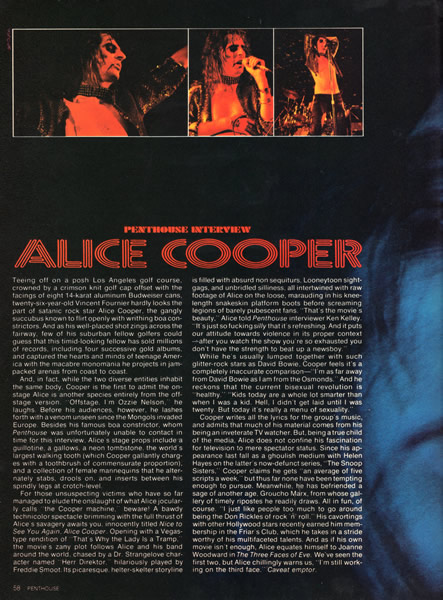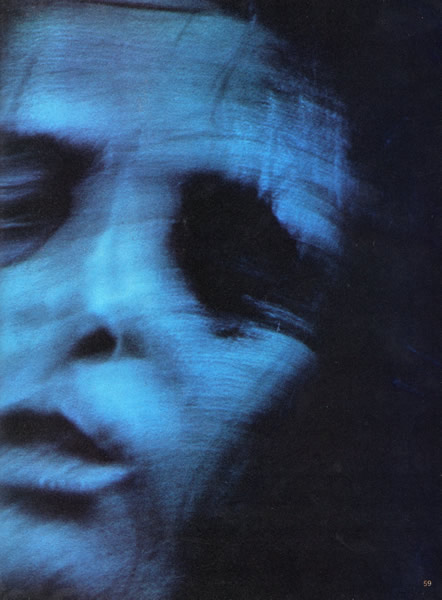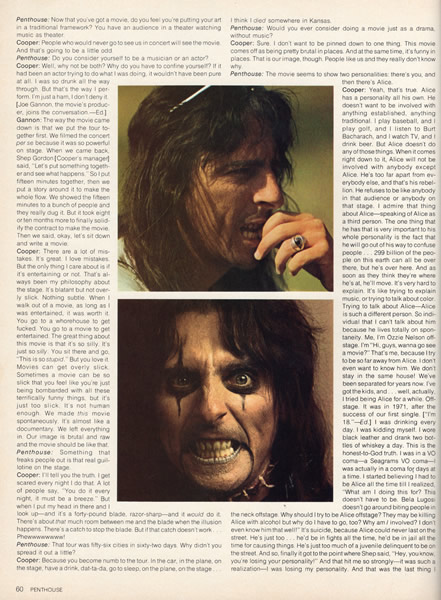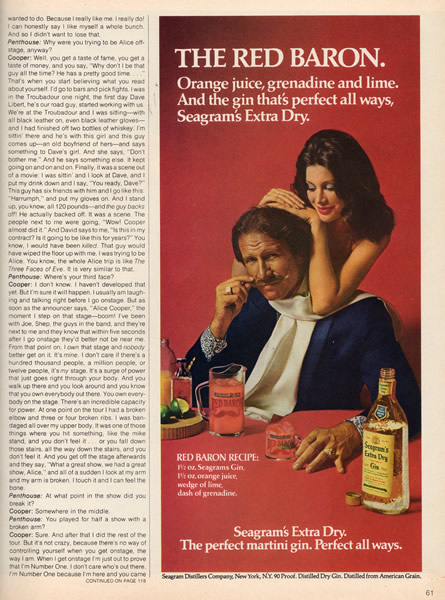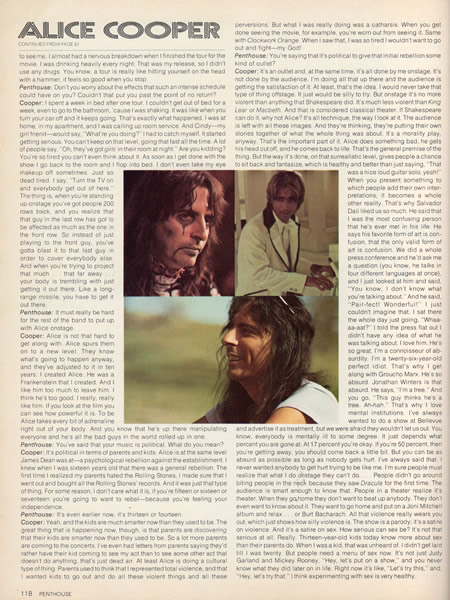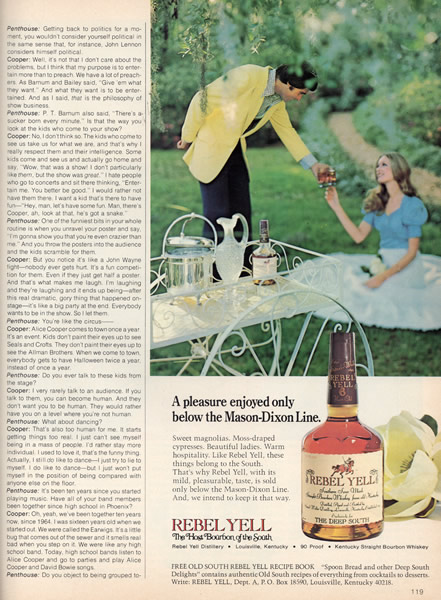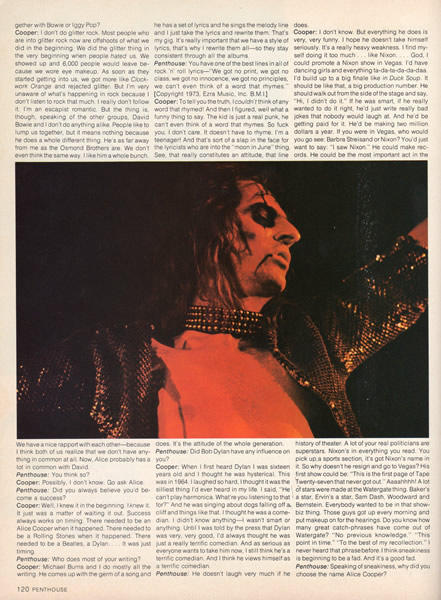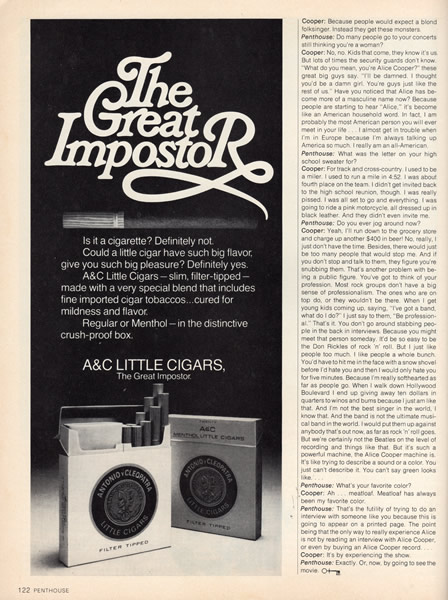Article Database
Alice Cooper
Penthouse Interview
Teeing off on a posh Los Angeles golf course, crowned by a crimson knit golf cap offset with the facing of eight 14-karat aluminum Budweiser cans, twenty-six-year-old Vincent Furnier hardly looks the part of satanic rock star Alice Cooper, the gangly succubus known to flirt openly with writhing boa constrictors. And as his well-placed shot zings across the fairway, few of his suburban fellow golfers could guess that this timid-looking fellow has sold millions of records, including four successive gold albums, and captured the hearts and minds of teenage America with the macabre monomania he projects in jam-packed arenas from coast to coast.
And, in fact, while the two diverse entities inhabit the same body, Cooper is the first to admit the onstage Alice is another species entirely from the offstage version. "Offstage, I'm Ozzie Nelson," he laughs. Before his audiences, however, he lashes forth with a venom unseen since the Mongols invaded Europe. Besides his famous boa constrictor, whom Penthouse was unfortunately unable to contact in time for the interview. Alice's stage props include a guillotine, a gallows, a neon tombstone, the world's largest walking tooth (which Cooper gallantly charges with a toothbrush of commensurate proportion, and a collection of female mannequins that he alternatively stabs, drools on, and inserts between his spindly legs at crotch-level.
For those unsuspecting victims who have so far managed to elude the onslaught of what Alice jocularly calls "the Cooper machine," beware! A bawdy technicolor spectacle brimming with the full thrust of Alice's savagery awaits you, innocently titled Nice To See You Again, Alice Cooper. Opening with a Vegas-type rendition of "That's Why the Lady Is A Tramp," the movie's zany plot follows Alice and his band around the world, chased by a Dr. Strangelove character named "Herr Direktor," hilariously played by Freddie Smoot. Its picaresque, helter-skelter storyline is filled with absurd non sequiturs, Looneytoon sightgags, and unbridled silliness, all intertwined with raw footage of Alice on the loose, marauding in his kneelength snakeskin platform boots before screaming legions of barely pubescent fans. "That's the movie's beauty," Alice told Penthouse interviewer Ken Kelley. "It's just so fucking silly that it's refreshing. And its puts our attitude towards violence in its proper context - after you watch the show you're so exhausted you don't have the strength to beat up a newsboy."
While he's usually lumped together with such glitter-rock stars as David Bowie, Cooper feels it's a completely inaccurate comparison - "I'm as far away from David Bowie as I am from the Osmonds." And he reckons that the current bisexual revolution is "healthy". "Kids today are a whole lot smarter than when I was a kid. Hell, I didn't get laid until I was twenty. But today it's really a menu of sexuality."
Cooper writes all the lyrics for the group's music, and admits that much of his material comes from being an inveterate TV watcher. But, being a true child of the media, Alice does not confine his fascination for television to mere spectator status. Since his appearance last fall as a ghoulish medium with Helen Hayes on the latters now-defunct series, "The Snoop Sisters," Cooper claims he gets "an average of five scripts a week," but thus far none have been tempting enough to pursue. Meanwhile, he has befriended a sage of another age, Groucho Marx, from those gallery of timely ripostes he readily draws. All in fun, of course. "I just like people too much to go around being the Don Rickles of rock 'n' roll." His cavortings with other Hollywood stars recently earned him membership in the Friar's Club, which he takes in a stride worthy of his multifaceted talents. And as if his own movie isn't enough, Alice equates himself Joanne Woodward in The Three Faces of Eve. We've seen the first two, but Alice chillingly warns us, "I'm still working on the third face." Caveat emptor
Now that you've got a movie, do you feel you're putting your art in a traditional framework? You have an audience in a theater watching music as theater.
People who would never go to see us in concert will see the movie. And that's going to be a little odd.
Do you consider yourself to be a musician or an actor?
Well, why not be both? Why do you have to confine yourself? If it had been an actor trying to do what I was doing, it wouldn't have been pure at all. I was so drunk all the way through. But that's the way I perform. I'm just a ham, I don't deny it. [Joe Gannon, the movie's producer, joins the conversation. -Ed.]
Gannon: The way the movie came down is that we put the tour together first. We filmed the concert per se because it was so powerful on stage. When we came back, Shep Gordon [Cooper's manager] said, "Let's put something together and see what happens." So I put fifteen minutes together, then we put a story around it to make the whole flow. We showed the fifteen minutes to a bunch of people and they really dug it. But it took eight or ten months more to finally solidify the contract to make the movie. Then we said, okay, let's sit down and write a movie.
There are a lot of mistakes. It's great. I love mistakes. But the only thing I care about is if it's entertaining or not. That's always been my philosophy about the stage. It's blatant but not overly slick. Nothings subtle. When I walk out of a movie, as long as I was entertained, it was worth it. You go to a whorehouse to get fucked. You go to a movie to get entertained. The great thing about this movie is that it's so silly. It's just so silly. You sit there and go, "This is so stupid." But you love it. Movies can get overly slick. Sometimes a movie can be so slick that you feel like you're just being bombarded with all these terrifically funny things, but it's just too slick. It's not human enough. We made this movie spontaneously. It's almost like a documentary. We left everything in. Our image is brutal and raw and the movie should be like that.
Something that freaks people out is that real guillotine on the stage.
I'll tell you the truth. I get scared every night I do that. A lot of people say, "You do it every night, it must be a breeze." But when I put my head in there and I look up - and it's a forty-pound, razor-sharp - and it would do it. There's about thatmuch room between me and the blade when the illusion happens. There's a catch to stop the blade. But if that catch doesn't work... Phewwwwwwww!
That tour was fifty-six cities in sixty-two days. Why didn't you spread it out a little?
Because you become numb to the tour. In the car, in the plane, on the stage, have a drink, dat-ta-da, go to sleep, on the plane, on the stage...I think I died somewhere in Kansas.
Would you ever consider doing a movie just as a drama, without music?
Sure. I don't want to be pinned down to one thing. This movie comes off as being pretty brutal in places. And at the same time, it's funny in places. That is our image, though. People like us and they really don't know why.
The movie seems to show two personalities: there's you, and then there's Alice.
Yeah, that's true. Alice has a personality all his own. He doesn't want to be involved with anything established, anything traditional. I play baseball, and I play golf, and I listen to Burt Bacharach, and I watch TV, and I drink beer. But Alice doesn't do any of those things. When it comes right down to it, Alice will not be involved with anybody except Alice. He's too far apart from everybody else, and that's his rebellion. He refuses to be like anybody in that audience or anybody on that stage. I admire that thing about Alice - speaking of Alice as a third person. The only thing that he has that is very important to his whole personality is the fact that he will go out of his way to confuse people... 299 billion of the people on this earth can all be over there, but he's over here. And as soon as they think they're where he's at, he'll move. It's very hard to explain. It's like trying to explain music, or trying to talk about color. Trying to talk about Alice - Alice is such a different person. So individual that I can't talk about him because he lives totally on spontaneity. Me, I'm Ozzie Nelson off-stage. I'm "Hi, guys, wanna go see a movie?" That's me, because I try to be so far away from Alice. I don't even want to know him. We don't stay in the same house! We've been separated for years now. I've got the kids, and... well, actually, I tried being Alice for a while. Offstage. It was in 1971, after the success of our first single. ["I'm 18." -Ed.] I was drinking every day. I was kidding myself. I wore black leather and drank two bottles of whiskey a day. This is the honest-to-God truth. I was in a VO coma - a Seagrams VO coma - I was actually in a coma for days at a time. I started believing I had to be Alice all the time till I realized, "What am I doing this for? This doesn't have to be. Bela Lugosi doesn't go around biting people in the neck offstage. Why should I try to be Alice offstage? They may be killing Alice with alcohol but why do I have to go, too? Why am I involved? I don't even know him that well!" It's suicide, because Alice could never last on the street. He's just too... he'd be in fights all the time, he'd be in jail all the time for causing things. He's just too much of a juvenile delinquent to be on the street. And so, finally it got to the point where Shep said, "Hey, you know, you're losing your personality!" And that hit me so strongly - it was such a realization - I was losing my personality. And that was the last thing I wanted to do. Because I really like me. I really do! I can honestly say I like myself a whole bunch. And so I didn't want to lose that.
Why were you trying to be Alice offstage, anyway?
Well, you get the taste of fame, you get a taste of money, and you say, "Why don't I be that guy all the time? He has a pretty good time...." That's when you start believe what you read about yourself. I'd go to bars and pick fights. I was in the Troubadour one night, the first day Dave Libert, he's our road guy, started working with us. We're at the Troubadour and I was sitting - with all black leather on, even black leather gloves - and I had finished off two bottles of whiskey. I'm sitting there and he's with this girl and this guy comes up - an old boyfriend of hers - and says something to Dave's girl. And she says, "Don't bother me." And he says something else. It kept going on and on. Finally, it was a scene out of a movie: I was sittin' and I look at Dave, and I put my drink down and I say, "You ready, Dave?" This guy has six friends with him and I go like this: "harrumph," and put my gloves on. And I stand up, you know, all 120 pounds - and the guy backs off!. He actually backed off. It was a scene. The people next to me were going, "Wow! Cooper almost did it." And Dave says to me, "Is this in my contract? Is it going to be like this for years?" That guy would have wiped up the floor with me. I was trying to be Alice. You know, the whole Alice trip is like The Three Faces of Eve. It's very similar to that.
Where's your third face?
I don't know. I haven't developed that yet. But I'm sure it will happen. I usually am laughing and talking right before I go onstage. But as soon as the announcer says, "Alice Cooper," the moment I step on that stage - boom! I've been with Joe, Shep, the guys in the band, and they're next to me and they know that within five seconds after I go onstage they'd better not be near me. From that point on, I own that stage and nobody better get on it. It's mine. I don't care if there's a hundred thousand people, a million people, or twelve people, it's my stage. It's a surge of power that just goes right through your body. And you walk up there and you look around and you know that you own everybody out there. You own everybody on the stage. There's an incredible capacity for power. At one point on the tour I had a broken elbow and three or four broken ribs. I was bandaged all over my upper body. It was one of those things where you hit something, like the mike stand, and you don't feel it... or you fall down those stairs, all the way down the stairs, and you don't feel it. And you get off the stage afterwards and they say, "What a great show, we had a great show, Alice," and all of a sudden I look at my arm and my arm is broken. I touch it and I can feel the bone.
At what point in the show did you break it?
Somewhere in the middle.
You played for half of a show with a broken arm?
Sure. And after that I did the rest of the tour. But it's not crazy, because there's no way of controlling yourself when you get onstage, the way I am. When I get onstage I'm just out to prove that I'm Number One. I don't care who's out there. I'm Number One because I'm here and you came to see me. I almost had a nervous breakdown when I finished the tour for the movie. I was drinking heavily every night. That was my release, so I didn't use any drugs. You know, a tour is really like hitting yourself on the head with a hammer, it feels so good when you stop.
Don't you worry about the effects that such an intense schedule could have on you? Couldn't that put you past the point of no return?
I spent a week in bed after one tour. I couldn't get out of bed for a week, even to go to the bathroom, 'cause I was shaking. It was like when you turn your car off and it keeps going. That's exactly what happened. I was at home, in my apartment, and I was calling up room service. And Cindy - my girlfriend - would say, "What're you doing?" I had to catch myself. It started getting serious. You can't keep on that level, going that fast all the time. A lot of people say, "Oh, they've got girls in their room at night." Are you kidding? You're so tired you can't even think about it. As soon as I get done with the show I go back to the room and I flop into bed. I don't even take my eye makeup off sometimes. Just so dead tired. I say, "Turn the TV on and everybody get out of here." The thing is, when you're standing up onstage you've got people 200 rows back, and you realize that that guy in the last row has got to be affected as much as the one in the front row. So instead of just playing to the front guy, you've gotta blast it to that last guy in order to cover everybody else. And when you're trying to project that much... that far away... your body is trembling with just getting it out there. Like a long range missile, you have to get it out there.
It must really be hard for the rest of the band to put up with Alice onstage.
Alice is not that hard to get along with. Alice spurs them on to a new level. They know what's going to happen anyway, and they've adjusted to it in ten years. I created Alice. He was a Frankenstein that I created. And I like him too much to leave him. I think he's too good. I really, really like him. If you look at the film you can see how powerful it is. To be Alice takes every bit of adrenaline right out of your body. And you know that he's up there manipulating everyone and he's all the bad guys in the world rolled up in one.
You've said that your music is political. What do you mean?
It's political in terms of parents and kids. Alice is at the same level James Dean was at - a psychological rebellion against the establishment. I knew when I was sixteen years old that there was a general rebellion. The first time I realized my parents hated the Rolling Stones, I made sure that I went out and bought all the Rolling Stones' records. And it was just that type of thing. For some reason, I don't care what it is, if you're fifteen or sixteen or seventeen you're going to want to rebel - because you're feeling your independence.
It's even earlier now, it's thirteen or fourteen.
Yeah, and the kids are much smarter now than they used to be. The great thing that is happening now, though, is that parents are discovering that their kids are smarter now than they used to be. So a lot more parents are coming to the concerts. I've even had letters from parents saying they'd rather have their kid coming to see my act than to see some other act that doesn't do anything, that's just dead air. At least Alice is doing a cultural type of thing. Parents used to think that I represented total violence, and that I wanted kids to go out and do all these violent things and all these perversions. But what I was really doing was a catharsis. When you get done seeing the movie, for example, you're worn out from seeing it. Same with Clockwork Orange. When I saw that, I was so tired I wouldn't want to go out and fight - my God!
You're saying that it's political to give that initial rebellion some kind of outlet?
It's an outlet and, at the same time, it's all done by me onstage. It's not done by the audience. I've doing all that up there and the audience is getting the satisfaction of it. At least, that's the idea. I would never take that type of thing offstage. It just would be silly to try. But onstage it's no more violent than anything that Shakespeare did. It's much less violent than King Lear or Macbeth. And that is considered classical theater. If shakespeare can do it, why not Alice? It's all technique, the way I look at it. The audience is left with all these images. And they're thinking, they're putting their own stories together of what the whole thing was about. It's morality play, anyway. That's the important part of it. Alice does something bad, he gets his head cut off, and he comes back to life. That's the general premise of the thing. But the way it's done, on that surrealistic level, gives people a chance to sit back and fantasize, which is healthy and better than just saying, "That was a nice loud guitar solo, yeah!" When you present something to which people add their own interpretations, it becomes a whole other reality. That's why Salvador Dali liked us so much. He said that I was the most confusing person that he's ever met in his life. He says his favorite form of art is confusion, that the only valid form of art is confusion. We did a whole press conference and he'd ask me a question (you know, he talks in four different languages at once), and I just looked at him and said, "You know, I don't know what you're talking about." And he said, "Per-fect! Wonderful!" I just couldn't imagine that. I sat there the whole day just going, "Whaaaa-aat?" I told the press flat out I didn't have any idea of what he was talking about. I love him. He's so great. I'm a connoisseur of absurdity. I'm a twenty-six-year-old perfect idiot. That's why I get along with Groucho Marx. He's so absurd. Jonathan Winters is that absurd. He says, "This guy thinks he's a tree. Ah-hah." That's why I love mental institutions. I've always wanted to do a show at Bellevue and advertise it as treatment, but we were afraid they wouldn't let us out. You know, everybody is mentally ill to some degree. It just depends what percent you are gone at. At 17 percent you're okay. If you're 50 percent, then you're getting away, you should come back a little bit. But you can be as absurd as possible as long as nobody gets hurt. I've always said that. I never wanted anybody to get hurt trying to be like me. I'm sure people must realize that what I do onstage they can't do... People didn't go around biting people in the neck because they saw Dracula for the first time. The audience is smart enough to know that. People in a theater realize it's theater. When they go home they don't want to beat up anybody. They don't even want to know about it. They want to go home and put on a Joni Mitchell album and relax... or Burt Bacharach. All that violence really wears you out, which just shows how silly violence is. The show is a parody; it's a satire on violence. And it's a satire on sex. How serious can sex be? It's not that serious at all. Really. Thirteen-year-old kids today know more about sex than their parents do. When I was a kid, that was unheard of. I didn't get laid till I was twenty. But people need a menu of sex now. It's not just Judy Garland and Mickey Rooney, "Hey, let's put on a show," and you never k now what they did later on in life. Right now it's like, "Let's try this," and, "Hey, let's try that." I think experimenting with sex is very healthy.
Getting back to politics for a moment, you wouldn't consider yourself political in the same sense that, for instance, John Lennon considers himself political.
Well, it's not that I don't care about the problems, but I think that my purpose is to entertain more than to preach. We have a lot of preachers. As Barnum and Bailey said, "Give 'em what they want." And what they want is to entertained. And as I said, that is the philosophy of show business.
P. T. Barnum also said, "There's a sucker born every minute." Is that the way you look at the kids who come to your show?
No, I don't think so. The kids who come to see us take us for what we are, and that's why I really respect them for their intelligence. Some kids come and see us and actually go how and say, "Wow, that was a show! I don't particularly like them, but the show was great." I hate people who go to concerts and sit there thinking, "Entertain me. You better be good." I would rather not have them there. I want a kid that's there to have fun - "Hey, man, let's have some fun. Man, there's Cooper, ah, look at that, he's got a snake."
One of the funniest bits in your whole routine is when you unravel your poster and say, "I'm gonna show you that you're even crazier than me." And you throw the posters into the audience and the kids scramble for them.
But you notice it's like a John Wayne fight - nobody ever gets hurt. It's a fun competition for them. Even if they get just half a poster. And that's what makes me laugh. I'm laughing and they're laughing and it ends up being - after this real dramatic, gory thing that happened onstage - it's like a big party at the end. Everybody wants to be in the show. So I let them.
You're like the circus -
Alice Cooper comes to town once a year. It's an event. Kids don't paint their eyes up to see Seals and Croft. They don't paint their eyes up to see the Allman Brothers. When we come to town, everybody gets to have Halloween twice a year, instead of once a year.
Do you ever talk to these kids from the stage?
I very rarely talk to an audience. If you talk to them, you can become more human. And they don't want you to be human. They would rather have you on a level where you're not human.
What about dancing?
That's also too human for me. It starts getting things too real. I just can't see myself being in a mass of people. I'd rather stay more individual. I used to love it, that's the funny thing. Actually, I still do like to dance - I just try and lie to myself. I do like to dance - but I just won't put myself in the position of being compared with anyone else on the floor.
It's been ten years since you started playing music. Have all your band members been together since high school in Phoenix?
Oh, yeah, we've been together ten years now, since 1964. I was sixteen years old when we started out. We were called the Earwigs. It's a little bug that comes out of the sewer and it smells real bad when you step on it. We were like any high school band. Today, high school bands listen to Alice Cooper and go to parties and play Alice Cooper and David Bowie songs.
Do you object to be grouped together with Bowie of Iggy Pop?
I don't do glitter rock. Most people who are into glitter rock now are offshoots of what we did in the beginning. We did the glitter thing in the very beginning when people hated us. We showed up and 6,000 people would leave because we wore eye makeup. As soon as they started getting into us, we got more like Clockwork Orange and rejected glitter. But I'm very unaware of what's happening in rock because I don't listen to rock that much. I really don't follow it. I'm an escapist romantic. But the thing is, though, speaking of other groups, David Bowie and I don't do anything alike. People like to lump us together, but it means nothing because he does a whole different thing. He's as far away from me as the Osmond Brothers are. We don't even think the same way. I like him a whole bunch. We have a nice rapport with each other - because I think both of us realize that we don't have anything in common at all. Now, Alice probably has a lot in common with David.
You think so?
Possibly, I don't know. Go ask Alice.
Did you always believe you'd become a success?
Well, I knew it in the beginning. I knew it. It was just a matter of waiting it out. Success always works on timing. There needed to be an Alice Cooper when it happened. There needed to be a Rolling Stones when it happened. There needed to be a Beatles, a Dylan. . . . It was just timing.
Who does most of your writing?
Michael Burns [Bruce] and I do mostly all the writing. He comes up with a germ of a song and he has a set of lyrics and he sings the melody line and I just take the lyrics and rewrite them. That's my gig. It's really important that we have a style of lyrics, that's why I rewrite them all - so they stay consistent through all the albums.
You have one of the best lines in all of rock 'n' roll lyrics - "We got no print, we got no class, we got no innocence, we got no principles, we can't even think up a word that rhymes." [Copyright 1973, Ezra Music, Inc. BMI]
To tell you the truth, I couldn't think of any word that rhymed! And then I figured, well what a funny thing to say. The kid is just a real punk, he can't even think of a word that rhymes. So fuck you. I don't care. It doesn't have to rhyme. I'm a teenager! And that's sort of a slap in the face for the lyricists who are into the "moon in June" thing. See, that really constitutes an attitude, that line does. It's the attitude of the whole generation.
Did Bob Dylan have any influence on you?
When I first heard Dylan I was sixteen years old and I thought he was hysterical. This was in 1964. I laughed so hard, I thought it was the silliest thing I'd ever heard in my life. I said, "He can't play harmonica. What're you listening to that for?" And he was singing about dogs falling off a cliff and things like that. I thought he was a comedian. I didn't know anything - I wasn't smart or anything. Until I was told by the press that Dylan was very, very good, I'd always thought he was just a really terrific comedian. And as serious as everyone wants to take him now, I still think he's a terrific comedian. And I think he views himself as a terrific comedian.
He doesn't laugh very much if he does.
I don't know. But everything he does is very, very funny. I hope he doesn't take himself seriously. It's a really heavy weakness. I find myself doing it too much . . . like Nixon . . . God, I could promote a Nixon show in Las Vages. I'd have dancing girls and everything ta-da-ta-da-da-daa. I'd build up to a big finale like in Duck Soup. It should be like that, a big production number. He should walk out from the side of the stage and say, "Hi, I didn't do it." If he was smart, if he really wanted to do it right, he'd just write really bad jokes that nobody would laugh at. And he'd be getting paid for it. He'd be making two million dollars a year. If you were in Vegas, who would you go see: Barbra Streisand or Nixon? You'd just want to say: "I saw Nixon." He could make records. He could be the most important act in the history of theater. A lot of your real politicians are superstars. Nixon's in everything you read. You pick up the sports section, it's got Nixon's name in it. So why doesn't he resign and go to Vegas? His first show could be: "This is the first page of Tape Twenty-seven that never got out." Aaaahhhh! A lot of stars were made at the Watergate thing. Baker's a star, Ervin's a star, Sam Dash, Woodward and Bernstein. Everybody wanted to be in that showbiz thing. Those guys got up every morning and put makeup on for the hearings. Do you know how many great catch-phrases have come out of Watergate? "No previous knowledge". "This point in time". "To the best of my recollection". I never heard that phrase before. I think sneakiness is beginning to be a fad. And it's a good fad.
Speaking of sneakiness, why did you choose the name Alice Cooper?
Because people would expect a blond folk singer. Instead they get these monsters.
Do many people go to your concerts still thinking you're a woman?
No, no. Kids that come, they know it's us. But a lot of times the security guards don't know. "What do you mean, you're Alice Cooper?" these great big guys say. "I'll be damned. I thought you'd be a damn girl. You're guys just like the rest of us." Have you noticed that Alice has become more of a masculine name now? Because people are starting to hear "Alice," it's become like an American household word. In fact, I'm probably the most American person you will ever meet in your life . . . I almost get in trouble when I'm in Europe because I'm always talking up America so much. I really am all-American.
What was the letter on your high school sweater for?
For track and cross-country. I used to run a mile in 4:52. I was about fourth place on the team. I didn't get invited back to the high school reunion, though. I was really pissed. I was all set to go and everything. I was going to ride a pink motorcycle, all dressed up in black leather. And they didn't invite me.
Do you ever jog around now?
Yeah, i'll run to the grocery store and charge up another $400 in beer! No, really, I just don't have the time. Besides, there would just be too many people that would stop me. And if you don't stop and talk to them, they figure you're snubbing them. That's another problem with being a public figure. You've got to think of your profession. Most rock groups don't have a big sense of professionalism. The ones who are on top do, or they wouldn't be there. When I get young kids coming up, saying, "I've got a band, what do I do?" I just say to them, "Be professional." That's it. You don't go around stabbing people in the back in interviews. Beacuse you might meet that person someday. It'd be easy to be the Don Rickles of rock 'n' roll. But I just like people too much. I like people a whole bunch. You'd have to hit me in the face with a snow shovel before I'd hate you and then I would only hate you for five minutes. Because I'm really softhearted as far as people go. When I walk down Hollywood Boulevard I end up giving away ten dollars in quarters to winos and bums because I just am like that. And I'm not the best singer in the world, I know that. And the band is not the ultimate musical band in the world. I would put them up against anybody that's out there, as far as rock 'n' roll goes. But we're certainly not the Beatles on the level of recording and things like that. But it's such a powerful machine, the Alice Cooper machine is. It's like trying to describe a sound or a color. You just can't describe it. You can't say green looks like. . . .
What's your favorite color?
Ah . . . meatloaf. Meatloaf has always been my favorite color.
That's the futility of trying to do an interview with someone like you because this is going to appear on the printed page. The point being that the only way to really experience Alice is not by reading an interview with Alice Cooper, or even by buying an Alice Cooper record. . . .
It's by experiencing the show.
Exactly. Or, by now, by going to see the movie.



